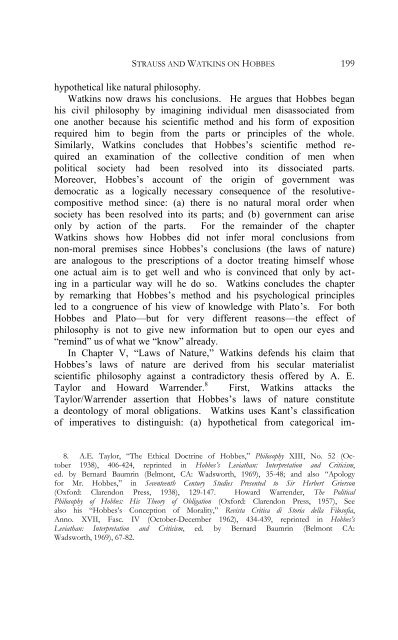Strauss and Watkins on Hobbes' Political Philosophy: A Review
Strauss and Watkins on Hobbes' Political Philosophy: A Review
Strauss and Watkins on Hobbes' Political Philosophy: A Review
Create successful ePaper yourself
Turn your PDF publications into a flip-book with our unique Google optimized e-Paper software.
STRAUSS AND WATKINS ON HOBBES 199<br />
hypothetical like natural philosophy.<br />
<str<strong>on</strong>g>Watkins</str<strong>on</strong>g> now draws his c<strong>on</strong>clusi<strong>on</strong>s. He argues that Hobbes began<br />
his civil philosophy by imagining individual men disassociated from<br />
<strong>on</strong>e another because his scientific method <str<strong>on</strong>g>and</str<strong>on</strong>g> his form of expositi<strong>on</strong><br />
required him to begin from the parts or principles of the whole.<br />
Similarly, <str<strong>on</strong>g>Watkins</str<strong>on</strong>g> c<strong>on</strong>cludes that Hobbes’s scientific method re-<br />
quired an examinati<strong>on</strong> of the collective c<strong>on</strong>diti<strong>on</strong> of men when<br />
political society had been resolved into its dissociated parts.<br />
Moreover, Hobbes’s account of the origin of government was<br />
democratic as a logically necessary c<strong>on</strong>sequence of the resolutive-<br />
compositive method since: (a) there is no natural moral order when<br />
society has been resolved into its parts; <str<strong>on</strong>g>and</str<strong>on</strong>g> (b) government can arise<br />
<strong>on</strong>ly by acti<strong>on</strong> of the parts. For the remainder of the chapter<br />
<str<strong>on</strong>g>Watkins</str<strong>on</strong>g> shows how Hobbes did not infer moral c<strong>on</strong>clusi<strong>on</strong>s from<br />
n<strong>on</strong>-moral premises since Hobbes’s c<strong>on</strong>clusi<strong>on</strong>s (the laws of nature)<br />
are analogous to the prescripti<strong>on</strong>s of a doctor treating himself whose<br />
<strong>on</strong>e actual aim is to get well <str<strong>on</strong>g>and</str<strong>on</strong>g> who is c<strong>on</strong>vinced that <strong>on</strong>ly by act-<br />
ing in a particular way will he do so. <str<strong>on</strong>g>Watkins</str<strong>on</strong>g> c<strong>on</strong>cludes the chapter<br />
by remarking that Hobbes’s method <str<strong>on</strong>g>and</str<strong>on</strong>g> his psychological principles<br />
led to a c<strong>on</strong>gruence of his view of knowledge with Plato’s. For both<br />
Hobbes <str<strong>on</strong>g>and</str<strong>on</strong>g> Plato—but for very different reas<strong>on</strong>s—the effect of<br />
philosophy is not to give new informati<strong>on</strong> but to open our eyes <str<strong>on</strong>g>and</str<strong>on</strong>g><br />
“remind” us of what we “know” already.<br />
In Chapter V, “Laws of Nature,” <str<strong>on</strong>g>Watkins</str<strong>on</strong>g> defends his claim that<br />
Hobbes’s laws of nature are derived from his secular materialist<br />
scientific philosophy against a c<strong>on</strong>tradictory thesis offered by A. E.<br />
Taylor <str<strong>on</strong>g>and</str<strong>on</strong>g> Howard Warrender. 8 First, <str<strong>on</strong>g>Watkins</str<strong>on</strong>g> attacks the<br />
Taylor/Warrender asserti<strong>on</strong> that Hobbes’s laws of nature c<strong>on</strong>stitute<br />
a de<strong>on</strong>tology of moral obligati<strong>on</strong>s. <str<strong>on</strong>g>Watkins</str<strong>on</strong>g> uses Kant’s classificati<strong>on</strong><br />
of imperatives to distinguish: (a) hypothetical from categorical im-<br />
8. A.E. Taylor, “The Ethical Doctrine of Hobbes,” <strong>Philosophy</strong> XIII, No. 52 (Oc-<br />
tober 1938), 406-424, reprinted in Hobbes’s Leviathan: Interpretati<strong>on</strong> <str<strong>on</strong>g>and</str<strong>on</strong>g> Criticism,<br />
ed. by Bernard Baumrin (Belm<strong>on</strong>t, CA: Wadsworth, 1969), 35-48; <str<strong>on</strong>g>and</str<strong>on</strong>g> also “Apology<br />
for Mr. Hobbes,” in Seventeenth Century Studies Presented to Sir Herbert Griers<strong>on</strong><br />
(Oxford: Clarend<strong>on</strong> Press, 1938), 129-147. Howard Warrender, The <strong>Political</strong><br />
<strong>Philosophy</strong> of Hobbes: His Theory of Obligati<strong>on</strong> (Oxford: Clarend<strong>on</strong> Press, 1957), See<br />
also his “Hobbes’s C<strong>on</strong>cepti<strong>on</strong> of Morality,” Revista Critica di Storia della Filosofia,<br />
Anno. XVII, Fasc. IV (October-December 1962), 434-439, reprinted in Hobbes’s<br />
Leviathan: Interpretati<strong>on</strong> <str<strong>on</strong>g>and</str<strong>on</strong>g> Criticism, ed. by Bernard Baumrin (Belm<strong>on</strong>t CA:<br />
Wadsworth, 1969), 67-82.
















